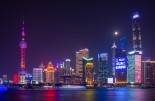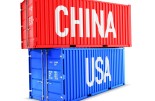Andy Langenkamp: America and China are redefining safe havens
Andy Langenkamp: America and China are redefining safe havens

This column was written in Dutch. This article is an English translation.
China is gearing up for a clash with America. As a heavy-handed strike approaches, financial markets are turned upside down.
By Andy Langenkamp, Senior Political Analyst at ECR Research
More than four in ten central bankers ranked geopolitical risk as one of their top concerns this spring. That is also a compelling reason why central banks have bought up gold en masse.
One of the main geopolitical risks is the tension between China and the US, with Taiwan as one of the hottest issues. Whether or not a confrontation over Taiwan is inevitable and whether it starts with a blockade or military action, China seems to want to prepare itself as well as possible strategically by, among other things, reducing its political, military, economic and technological to become vulnerable. The ways in which Beijing is trying to achieve this – to a greater or lesser extent successfully – are:
- ensuring that the renminbi plays a much more prominent role in the global economy and financial markets;
- making other countries more dependent on China in other ways;
- reduce dependence on essential imports;
- draw more countries into the Chinese camp;
- encouraging or at least not inhibiting developments that reduce other countries' confidence in the US and Western-dominated institutions (unless they also harm China itself);
- increasing military capabilities, making other countries more likely to comply with China's wishes;
- expanding the lead economically and technologically in areas where China already has the lead or step up catching up there.
By following these paths, China has become increasingly resilient militarily, politically, financially and economically. Looking at China's strength and might, a large-scale conflict over Taiwan is therefore increasingly likely.
However, America is still firmly in its shoes. It is true that it is less solid than in the 1990s, but it is difficult to knock the US out of its place. John Mearsheimer stated in 2001 that the US was the only country that held the absolute top position in its own region and at the same time was able to prevent other great powers from dominating regions elsewhere. This position still largely holds, although it is crumbling in parts of Asia.
In addition, various factors undermine America's prestige and strength, including the debt-ceiling circus, a presidential race between two very old, flawed candidates, and a war in Ukraine that - the longer it lasts - increasingly tests Western unity.
If markets get the impression that America is faltering and that China will take advantage (or abuse) of it, we will see major(er) shifts in the financial markets. Some of them faster, others steadily. A long-term risk-off climate is obvious, but the question is what can then still be regarded as a safe haven. Will the current safe havens, such as the dollar, the yen, US government bonds and gold, continue to be popular, or will ideas about them be overhauled? In any case, countries that can avoid a Sino-American clash as much as possible can become fashionable among investors. Those could then be countries in regions that don't usually pop up first in the minds of investors and investors in Europe and the US, such as Latin America and Africa. Furthermore, gold holds a lot of potential in such uncertain times.







